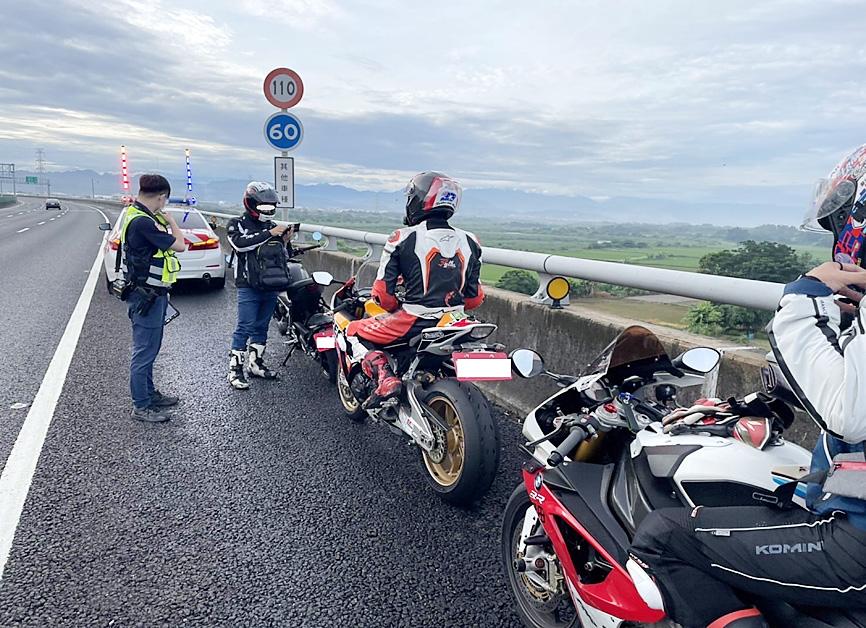Motorcycle riders are to drive on freeways from today until Sunday next week to protest the government’s decades-long policy of restricting their access to freeways.
Motorcycles with an engine displacement of 250 cubic centimeters (cc) or more are only allowed to access National Freeway 3A, a 5.6km-long spur of the Formosa Freeway that connects Taipei and New Taipei City.
Motorcyclists planning the protest are part of an online campaign called “Ride on Highways.” Prior to this two-week protest, heavy motorcycle riders rode on freeways from July 1 to 4, during which 91 of them were intercepted by freeway police.

Photo courtesy of highway patrol police
As the Freeway Bureau and Ministry of Transportation and Communications have yet to respond to their appeal, the campaigners wrote on Facebook on Saturday that they would launch a bigger protest by encouraging the 15 million motorcyclists across the country who own 50cc motorcycles or larger to ride on freeways for the next two weeks.
Motorcyclists have the right to access freeways and would abide by traffic rules, they said.
Taiwan became a signatory of the Vienna Convention on Road Traffic on Nov. 8, 1968, and is qualified to issue international driver’s licenses, they said, adding that the country’s traffic regulations should be consistent with those stipulated by international organizations.
While Article 25 of the convention states in principle that all motorcycles should be allowed to access motorways, the article also stipulates that motor vehicles that are given access to motorways must be capable of attaining the flat road speed limit specified by domestic legislation, the campaigners said.
Taiwan’s minimum speed limit on freeways is 60kph, they said, adding that it should be a criterion that the government takes into account when it decides the types of motor vehicles that are allowed on freeways.
An amendment to the Road Traffic Management and Penalty Act (道路交通管理處罰條例) was passed on July 1, 2012, allowing motorcycles with an engine size of more than 550cc on freeways, but the government is still only allowing heavy motorcycles to operate on Freeway 3A a decade after the amendment passed, they said.
“In the past 10 years, the ministry has neither told the public about the amendment nor stipulated any supporting measures for it on the grounds that the public did not support such an amendment,” the campaigners said.
“Taiwan is not a country ruled by public opinion, and the government has no legal basis to govern the country through public surveys. The ministry has infringed our freedom and denied us access to road services funded by taxpayers, which we cannot accept,” they said.
In 2017 and 2020, the Freeway Bureau evaluated the performance of motorcyclists along designated sections of freeway on a trial basis and found they were not involved in any fatal traffic accidents, they added.
The Freeway Bureau said heavy motorcycle riders should follow traffic regulations and avoid inconveniencing road users.
“The Directorate-General of Highways is compiling educational materials related to heavy motorcycles and changing how a motorcycle license should be obtained,” the bureau said. “We will resume discussions on this issue after gathering more information.”
Motorcyclists riding on freeways would be fined NT$3,000 to NT$6,000 for each infringement and have to pay the towing fees themselves, it said.

The Ministry of Education (MOE) is to launch a new program to encourage international students to stay in Taiwan and explore job opportunities here after graduation, Deputy Minister of Education Yeh Ping-cheng (葉丙成) said on Friday. The government would provide full scholarships for international students to further their studies for two years in Taiwan, so those who want to pursue a master’s degree can consider applying for the program, he said. The fields included are science, technology, engineering, mathematics, semiconductors and finance, Yeh added. The program, called “Intense 2+2,” would also assist international students who completed the two years of further studies in

Former president Tsai Ing-wen (蔡英文) departed for Europe on Friday night, with planned stops in Lithuania and Denmark. Tsai arrived at Taiwan Taoyuan International Airport on Friday night, but did not speak to reporters before departing. Tsai wrote on social media later that the purpose of the trip was to reaffirm the commitment of Taiwanese to working with democratic allies to promote regional security and stability, upholding freedom and democracy, and defending their homeland. She also expressed hope that through joint efforts, Taiwan and Europe would continue to be partners building up economic resilience on the global stage. The former president was to first

Former president Tsai Ing-wen (蔡英文) on Monday called for greater cooperation between Taiwan, Lithuania and the EU to counter threats to information security, including attacks on undersea cables and other critical infrastructure. In a speech at Vilnius University in the Lithuanian capital, Tsai highlighted recent incidents in which vital undersea cables — essential for cross-border data transmission — were severed in the Taiwan Strait and the Baltic Sea over the past year. Taiwanese authorities suspect Chinese sabotage in the incidents near Taiwan’s waters, while EU leaders have said Russia is the likely culprit behind similar breaches in the Baltic. “Taiwan and our European

The Taipei District Court sentenced babysitters Liu Tsai-hsuan (劉彩萱) and Liu Jou-lin (劉若琳) to life and 18 years in prison respectively today for causing the death of a one-year-old boy in December 2023. The Taipei District Prosecutors’ Office said that Liu Tsai-hsuan was entrusted with the care of a one-year-old boy, nicknamed Kai Kai (剴剴), in August 2023 by the Child Welfare League Foundation. From Sept. 1 to Dec. 23 that year, she and her sister Liu Jou-lin allegedly committed acts of abuse against the boy, who was rushed to the hospital with severe injuries on Dec. 24, 2023, but did not